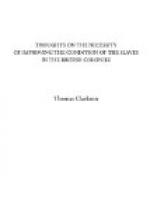Having now given a concise history of the abolition of slavery in St. Domingo, I shall inquire how those who were liberated on these several occasions conducted themselves after this change in their situation. It is of great importance to us to know, whether they used their freedom properly, or whether they abused it.
With respect to those emancipated by Santhonax in the North, we have nothing to communicate. They were made free for military purposes only; and we have no clue whereby we can find out what became of them afterwards.
With respect to those who were emancipated next in the South, and those directly afterwards in the West, by the proclamation of Polverel, we are enabled to give a very pleasing account. Fortunately for our views, Colonel Malenfant, who was resident in the island at the time, has made us acquainted with their general conduct and character. His account, though short, is quite sufficient for our purpose. Indeed it is highly satisfactory[6]. “After this public act of emancipation,” says he, (by Polverel,) “the Negroes remained quiet both in the South and in the West, and they continued to work upon all the plantations. There were estates, indeed, which had neither owners nor managers resident upon them, for some of these had been put into prison by Montbrun; and others, fearing the same fate, had fled to the quarter which had just been given up to the English. Yet upon these estates, though abandoned, the Negroes continued their labours, where there were any, even inferior, agents to guide them; and on those estates, where no white men were left to direct them, they betook themselves to the planting of provisions; but upon all the plantations where the Whites resided, the Blacks continued to labour as quietly as before.” A little further on in the work, ridiculing the notion entertained in France, that the Negroes would not work without compulsion, he takes occasion to allude to other Negroes, who had been liberated by the same proclamation, but who were more immediately under




